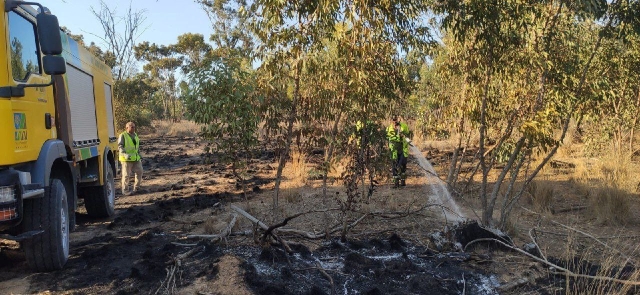In recent days, including Tuesday evening, numerous young Palestinians engaged in riots in various areas near the Gaza Strip border. Along the border, an IDF sniper position was on high alert, prompting the Israeli Air Force to launch a drone strike on a Hamas position in Rafah. Approximately an hour later, the IDF conducted additional strikes on two separate Hamas positions within the Gaza Strip.
The rioters were observed setting fire to tires they had brought to the scene, and in one instance, they even hurled an explosive device towards the perimeter fence. The IDF reported that these breaches of security included a surge in live ammunition being fired by terrorists at Israeli security forces. To maintain order, the security forces utilized crowd dispersal methods and live fire against the main instigators, leading to several confirmed hits.
Palestinians at the direction of Hamas are violently rioting once again at the Gaza border
— Adam Milstein (@AdamMilstein) September 26, 2023
Here, a Palestinian who was so badly injured he was being carried away on a stretcher suddenly recovers and runs. 🤦🏻♂️
pic.twitter.com/J0Zz3TTL0n
Earlier in the day, incendiary balloons were launched, sparking a fire in the Shaar HaNegev Regional Council. After investigation, a Fire Department expert attributed the fire to an incendiary balloon. During the afternoon, farmers in the Eshkol region identified balloons carrying explosive charges that detonated in mid-air.
The primary epicenter of these riots was in Rafah, while another hotspot was the old Karni crossing, situated east of Gaza City. At this location, terrorists tossed a Molotov cocktail over the fence, igniting an IDF sniper position; fortunately, there were no casualties. Responding swiftly, the Air Force conducted an airstrike on a nearby Hamas position. Approximately an hour later, the IDF launched attacks on two more Hamas military positions, one in Karni and the other in Rafah, using a combat helicopter and a tank.
Early Wednesday, Israel conveyed a message to Hamas through UN envoy Tor Wennesland, who entered the Gaza Strip via the Erez crossing with the aim of promoting peace. The message conveyed that once the violent demonstrations along the fence cease, and the firing of incendiary balloons towards the border ends, the crossing will be reopened for the movement of laborers. Egyptian and Qatari mediators also relayed the same message.
Footage shared on Hamas-linked Telegram pages shows Palestinians opening fire at IDF troops along the Gaza-Israel border. The violent riots, which began the week of September 10th, were supposedly meant to ‘commemorate’ Israel’s 2005 disengagement from Gaza. Since then,… pic.twitter.com/pG9gu6eVtM
— The Israel Files (@theisraelfiles) September 26, 2023
The decision to close the Rafah crossing for laborers was made approximately a week ago in response to border order violations. These violations marked an attempt to revive the weekly riots that had ceased three years ago. The closure of the crossing has placed significant economic pressure on the Gaza Strip. With 18,500 Gazan workers unable to commute to their jobs in Israel each day, the Gazan economy suffers losses exceeding ten million shekels daily.


